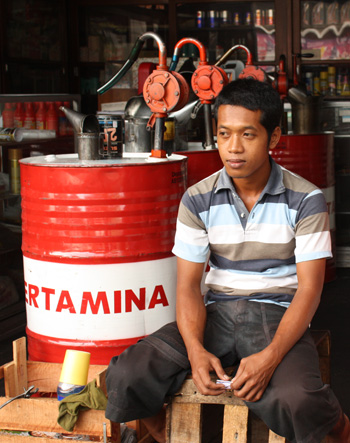Self Rumbewas
The poor depend on access to cheap fuelSelf Rumbewas |
For decades, the Indonesian government has quite literally fuelled economic growth by underwriting transportation costs, subsidising electricity generation, and assisting fuel-dependent businesses. Fuel subsidies have been instrumental in maintaining Indonesia’s inflation rate, minimising inflation in the price of food items and consumer goods, and providing direct financial assistance to the poor. In line with its bid to realise advanced economy status by the year 2025, fuel subsidies have also become crucial in maintaining Indonesia’s economic fundamentals, including a strong Rupiah value.
The Indonesian government has conceded that its fuel subsidies are fiscally burdensome, announcing that it will begin to restrict the provision of subsidised fuel from 1 April 2012. The restriction will prevent private car holders from being able to purchase subsidised fuel. It will be implemented gradually over two years. But the restriction will not change the price of subsidised fuel – which will continue to be sold at Rp.4500 (AU$0.48) per litre for motorcyclists, public transport and businesses, identified by yellow registration plates.
It appears that the economic imperatives behind the implementation of the subsidies in the first place still out-trump pressures to phase out fuel subsidies as called for by international financial institutions such as the Organisation for Economic Cooperation and Development and World Bank. In fact, the government’s change in fuel policy won’t reduce the fiscal burden of fuel subsidies at all. In 2011, fuel subsidies cost the state approximately Rp.168 trillion (AU$17.7 billion), Rp.38 trillion in excess of its revised budget allocation of Rp.127 trillion ($AU13.6 billion). In 2012, the government has planned to allocate Rp.123 trillion (AU$13.1 billion) – a mere 4 per cent reduction from the previous year’s budget allocation.
It is clear, then, that the government has maintained the status quo of dependency on fuel subsidies, by restricting the provision of subsidised fuel, without making any reduction to subsidies. More concerning however, is that the missed opportunity to adequately address the roll-back of subsidies, fails to see the implications of the policy in a broader view.
The looming crisis
The government’s decision to play around at the edges rather than dropping subsidies altogether seems a strange one, given the impending scarcity of fuel and the inevitability of oil price shocks. Scientists at Kuwait University and Kuwait Oil Company predict that by 2014 – the year they dub ‘the year of Peak Oil’ – global oil demand will exceed global supplies. This prediction might sound extreme but, even if their calculations are out, impending oil shortages clearly increase the urgency of dealing with Indonesia’s diminishing energy security. Even by Indonesian government’s own admission, as outgoing Minister for Energy and Mineral Resources Darwin Zahedy Saleh has said, it is expected that Indonesia’s own oil reserves will be depleted by 2034.
Indonesia’s vulnerability to future oil price shocks underpins a strong case for decreasing subsidies across the board, and to use the money it would have spent on them to insure itself against oil shocks. At least, this is what Maizar Rahman, former acting secretary of OPEC, thinks. According to Rahman, Indonesia should be increasing its strategic petroleum reserves (which currently stand at approximately 20 to 25 days) to at least 30 days – in other words, increase the country’s stockpile of petrol to provide a buffer against shocks. This would cost the government Rp.20-30 trillion rupiah in increased production capacity and storage facilities.
The freeing up of state revenues could also be used to invest in liquefied natural gas (LNG) or compressed natural gas (CNG) conversion technologies and storage facilities, as a means of easing vehicle petroleum consumption. Both forms of fuel are at least 40 per cent more affordable than market rate petroleum and environmentally much cleaner. The government could help amortise the cost by subsidising conversion kits for public transport service providers and businesses to make this attractive. But this kind of initiative would need to be accompanied by petrol subsidy reductions in order to make it a viable solution.
On the horns of a dilemma
There is no doubt that fear of jeopardising Indonesia’s economic performance lies at the heart of the government’s indecisiveness over fuel subsidies. With its aim of becoming an advanced economy by 2025 by generating domestic consumption whilst luring foreign investment, the government does not wish to make any policy missteps, especially while inflation is at an historic low.
There is also no doubt that the government is worried about the social impact of reducing fuel subsidies. Under the current plan, fuel subsidies will continue to be provided to registered businesses (most notably for the transport of food stuffs and goods around the archipelago). If the government cut deeper, the poor and near-poor would be the first to suffer from inevitable increases in the price of basic necessities.
Social unrest is also a major fear. Power-brokers are only too aware of the backlash that would be triggered by soaring petrol prices – the memory of the May 1998 demonstrations, when President Suharto imposed similar price increases, is still fresh in their minds. Indeed, with the 2014 presidential elections fast approaching, the possibility of rolling back subsidies across the board seems almost impossible.
But the cost of not taking stronger measures is also very real. If an oil shock does come before serious steps are taken to reduce Indonesia’s exposure, the country’s economic fortunes could be totally reversed – leading not only to the very kinds of consumer price inflation the government wants to avoid, but also to far more serious damage to the economy. It might not be the easiest decision politically, or socially, to drastically reduce fuel subsidies. But the only way to really guarantee the future welfare of the people is to guarantee Indonesia’s energy security.
Self Rumbewas (self.rumbewas@gmail.com) holds an Honours degree in Indonesian Studies from the University of Sydney.
